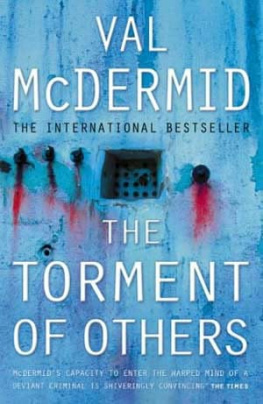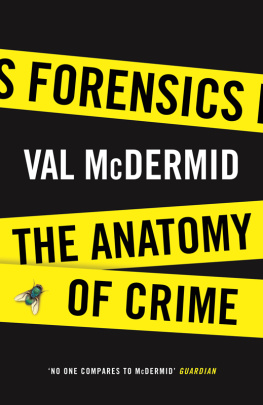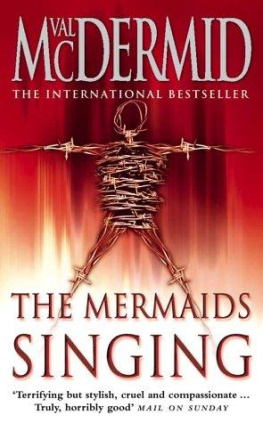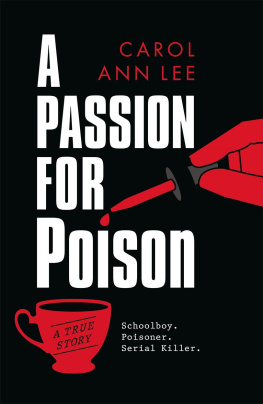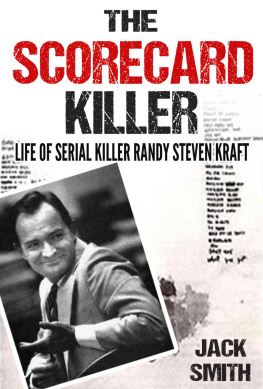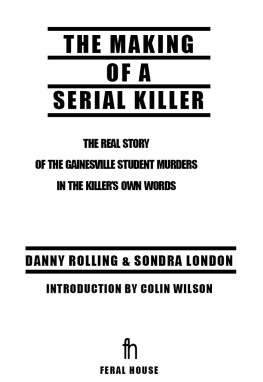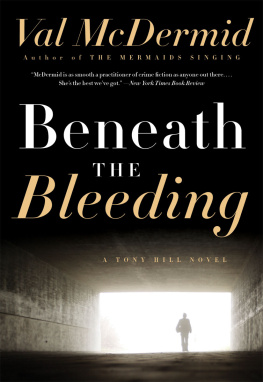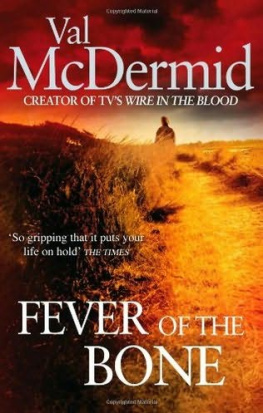home@page { margin-bottom: 5.000000pt; margin-top: 5.000000pt; } The Torment Of Others By Val McDermid Acknowledgements As usual, I owe a debt of thanks to those who generously give of their time and expertise in a bid to keep me within the bounds of accuracy. I am grateful to the Greenfield Girls for letting loose the dogs of narrative; Angus Marshall for advice on the forensic aspects of computing; Dr. Ray Murray for geological assistance; Dr. Sue Black for matters pathological; Brigid Baillie for legal procedure; and the late Kathy Wilkes for first introducing me to the mind body problem. For their perennial support, Julia Wisdom and Anne O'Brien at HarperCollins; Jane, Broo, Anna, Claire and Terry at Gregory &c Company; Trina Furre at Riverdale; and Sandra, Ken and Robson at Coastal. Extract from The Four Quartets by TS Eliot (published by Faber and Faber Ltd) reproduced by kind permission of Faber and Faber Ltd.
For Leslie, Sandra, Julia, Jane, Maria, Mel, Margaret, Nicky, Jenni, Mary, Julie, Paula, Jai, Diana, Stella, Shelley, Daphne and Bunty Al my personal monstrous regiment of women who brought back the wounded from the battlefield and tended me till I was better. With love and thanks. But the torment of others remains an experience Unqualified, unworn by subsequent attrition. People change, and smile: but the agony abides. TS Eliot "The Dry Salvages', Four Quartets All torment, trouble, wonder, and amazement Inhabits here. Some heavenly power guide us Out of this fearful country! William Shakespeare The Tempest PART ONE lust because you hear voices, it doesn't mean you're mad.
You don't have to be well smart to know that. And even though you did all that stuff that made the jury look sick to their stomachs, at least you're clever enough to know that doesn't make you a nutter. All sorts of people have other voices in their heads, everybody knows that. Like on the telly. Even though you can believe it when you're watching it, everybody knows it's not real. And somebody's got to have dreamed it up in the first place without them ending up where you have.
Stands to reason. So you're not worried. Well, not very worried. OK, they said you were insane. The judge said your name, Derek Tyler, and he tagged you with the mad label. But even though he's supposed to be a smart bastard, that judge didn't know he was following the plan.
The way to avoid the life sentence that they always hand down when somebody does what you did. If you make them believe you were off your head when you did it, then it isn't you that did the crime, it's the madness in you. And if you're mad, not bad, it stands to reason you can be cured. Which is why they lock you up in the nuthouse instead of the nick. That way the doctors can poke around in your head and have a crack at fixing what's broke. Of course, if nothing's broke in the first place, the best thing you can do is keep your mouth zipped.
Not let on you're as sane as them. Then, when the time is right, you can start talking. Make it look like they've somehow worked their magic and turned you into somebody they can let out on the street again. It sounded really easy when the Voice explained it. You're pretty sure you got it right, because the Voice went over it so many times you can replay the whole spiel just by closing your eyes and mouthing the words: I am the Voice. I am your Voice.
Whatever I tell you to do is for the best. I am your Voice. This is the plan. Listen very carefully." That's the trigger. That's all it takes. The intro that makes the whole tape play in your head.
The message is still there, implanted deep inside your brain. And it still makes sense. Or at least, you think it does. Only, it's been a long time now. It's not easy, staying on the wrong side of silence day after day, week after week, month after month. But you're pretty proud of the way you've hung on to it.
Because there's all the other stuff interfering with the Voice. Therapy sessions where you have to blank what the real nutters are going on about. Counselling sessions where the doctors try and trick you into words. Not to mention the screaming and shouting when somebody goes off on one. Then there's all the background noise of the day room, the TV and the music rumbling round your head like interference. All you have to fight back with is the Voice and the promise that the word will come when the time is right.
And then you'll be back out there, doing what you've discovered you do best. Killing women. Find them in the first six hours or you're looking for a corpse. Find them in the first six hours or you're looking for a corpse. The missing children mantra mocked Detective Inspector Don Merrick. He was looking at sixteen hours and counting.
And counting was just what the parents of Tim Golding were doing. Counting every minute that took them further from their last glimpse of their son. He didn't have to think about what they were feeling; he was a father and he knew the visceral fear lying in wait to assail any parent whose child is suddenly, unaccountably not where they should be. Mostly, it was history in a matter of minutes when the child reappeared unscathed, usually grinning merrily at the panic of its parents. Nevertheless it was history that left its mark bone deep. And sometimes there was no relief.
No sudden access of anger masking the ravages of ill-defined terror when the child reappeared. Sometimes it just went on and on and on. And Merrick knew the dread would continue screaming inside Alastair and Shelley Golding until his team found their son. Alive or dead. He knew because he'd witnessed the same agony in the lives of Gerry and Pam Lefevre, whose son Guy had been missing now for just over fifteen months. They'd dragged the canal, combed the parks and wasteland within a two-mile radius, but not a trace of Guy had ever surfaced.
Merrick had been the bagman on that inquiry, which was the main reason why he'd been assigned to Tim Golding. He had the knowledge to see" whether there were obvious links between the cases. But beyond knowledge, his instincts already nagged that whoever had snatched Guy Lefevre had now claimed his second victim. He leaned against the roof of his car and swept the long curve of the railway embankment with binoculars. Every available body was down there, combing the scrubby grass for any trace of the eight-year-old boy who had been missing since the previous evening. Tim had been playing with two friends, some complicated game of make-believe involving a superhero that Merrick vaguely remembered his own sons briefly idolizing.
The friends had been called in by their mother and Tim had said he was going down the embankment to watch the freight trains that used this spur to bring road stone from the quarry on the outskirts of the city to the railhead. Two women heading for the bus stop and bingo thought they'd caught a glimpse of his canary yellow Bradfield Victoria shirt between the trees that lined the top of the steep slope leading down to the tracks. That had been around twenty to eight. Nobody else had come forward to say they'd seen the boy. His face was already etched on Merrick's mind. The school photograph resembled a million others, but Merrick could have picked out Tim's sandy hair, his open grin and the blue eyes crinkled behind Harry Potter glasses from any line-up.
Just as he could have done with Guy Lefevre. Wavy dark brown hair, brown eyes, a scatter of freckles across his nose and cheeks. Seven years old, tall for his age, he'd last been seen heading for an overgrown stand of trees on the edge of Downton Park, about three miles from where Merrick was standing now. It had been around seven on a damp spring evening. Guy had asked his mother if he could go out for another half-hour's play. He'd been looking for birds' nests, mapping them obsessively on a grid of the scrubby little copse.
They'd found the grid two days later, on the far edge of the trees, crumpled into a ball twenty yards from the bank of the disused canal that had once run from the railhead to the long-silent wool mills. That had been the last anyone had seen of anything connected to Guy Lefevre. And now another boy seemed also to have vanished into thin air. Merrick sighed and lowered the binoculars. They'd had to wait for daylight to complete their search of the area. They'd all clung to a faint hope that Tim had had an accident, that he was lying somewhere injured and unable to make himself heard.
Next page
